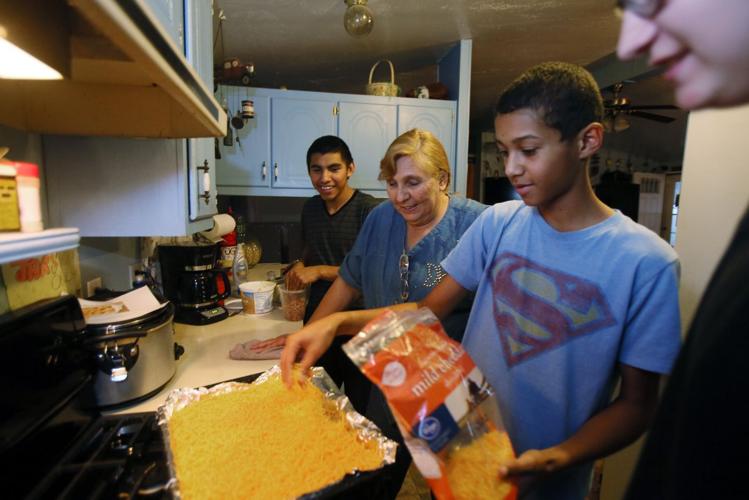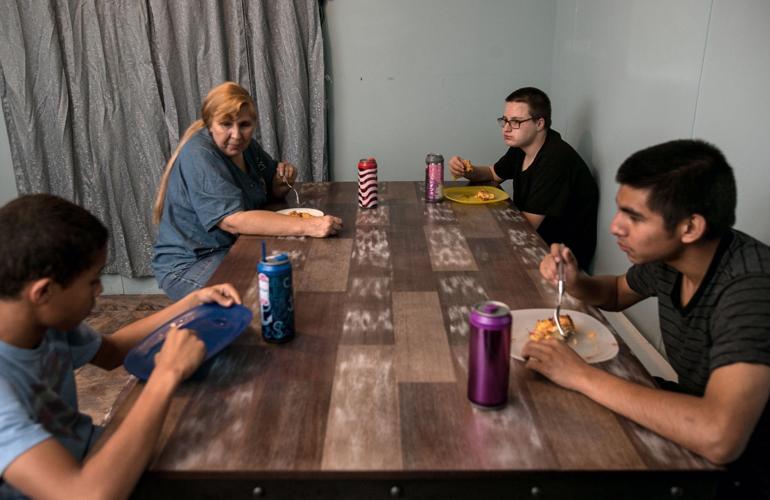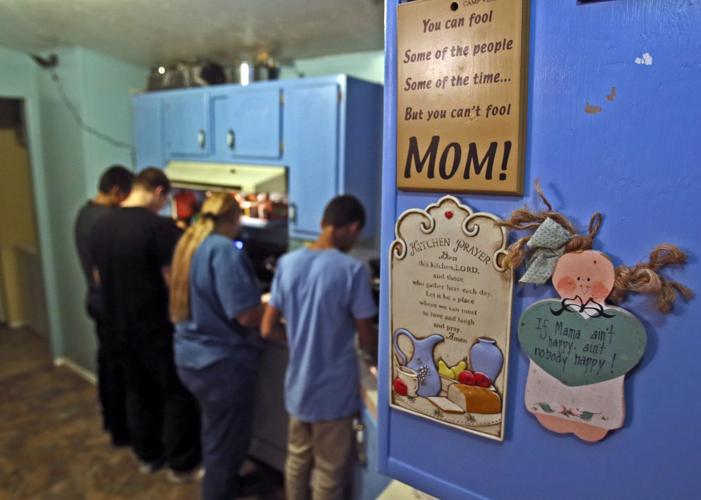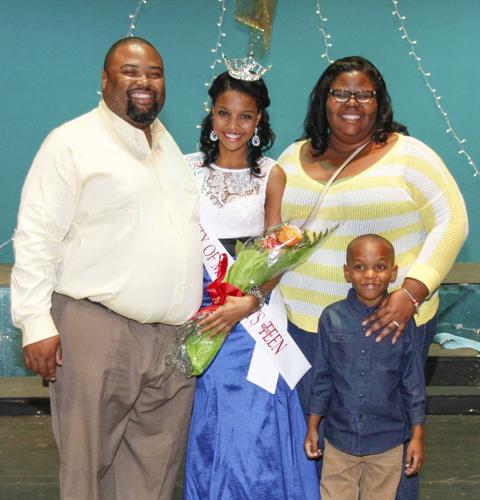BJ Martin expects her teens to test boundaries sometimes — she even welcomes it.
What gets her is that so many teens in foster care wind up alone, trying to negotiate the years from childhood into adulthood without a family to love them. Many are unfairly stereotyped and deemed too challenging to help, she says, when a bit more patience and understanding can quickly break down barriers.
“If I had a bigger home, I’ll tell you, there are other kids I’d adopt,” said Martin, who has taken in 15 to 20 foster children over the years, and recently adopted her fourth teen boy.
In Pima County alone, 964 children over age 11 are in the dependency system this month, and 38 percent are in need of adoptive homes, Juvenile Court Center records show.
Children ages 1 to 5 make up the greatest number of removals statewide, at 33.1 percent of all children between September 2014 through March. Teens make up 21.7 percent, Department of Child Safety records show.
But unlike their younger counterparts, teens account for 48 percent of children living in shelters or transitional homes. Those are supposed to be temporary placements, but teens often languish there.
Of the 45 children who left DCS custody by running away from September 2014 to March, all were ages 13 and older, and 24 percent had been in five or more different placements.
“Teens these days are the most likely to be left behind,” said Robert Lewis, a Massachusetts-based consultant who works with child welfare agencies nationwide and advocates for teen adoptions. “A lot of them transition into adulthood alone and that need for family is there, even after you’re an adult.”
Seeing the hurt
Too often, Lewis said, teens are “carrying around the very misconceptions that we have put on them.” People expect foster teens to “shape up” without taking an interest in why they might be acting out.
About 20,000 teens nationwide age out of the foster care system alone each year, he said.
“If you start seeing them in terms of their development, their trauma and their grief, it really changes who they are,” he said.
Raytheon engineer Apache Sanders can attest to that.
Sanders was volunteering with students in Tucson Unified School District through the National Society of Black Engineers when she met her future daughter, Dimon, then 13.
Dimon had been in foster care since she was 9 and was eligible for adoption. Apache and her husband, Joshua, were hoping to adopt. The match felt evident, but even so, their first conversations weren’t easy.
“I could tell that she had been hurt a lot and had her guard up,” Sanders said of those first days together in December 2013 “She was looking at me out of the corner of her eye wondering, ‘What’s the deal? What’s the catch?’ ”
Sanders took Dimon out out to dinner so they could talk more, but Dimon hardly spoke. Later, Sanders said her daughter told her she couldn’t believe Sanders was interested in her and kept wondering, “Why in the world would anyone want to adopt a teenager when they could adopt a little kid or a baby?”
Over the holidays that year, Sanders and her husband picked up Dimon every day from the emergency shelter and took her to their home, where she got to know their biological son, Joshua Jr. Those weeks changed everything. By April, foster care training was completed and Dimon was living with them. By October, she was legally their child.
“We did a lot of talking and we tried to be patient,” Sanders said. “One thing we were told that helped a lot was not to take things personally, that the stuff she was going through was about everything that had gone on before.”
This year, Dimon is earning A’s and B’s and has been participating in Miss America Scholarship Pageants. Last January, she was named Miss Tucson’s Desert Rose’s Outstanding Teen and a week ago she was again crowned, this time as Miss City of Maricopa’s Outstanding Teen.
As part of the pageants, Dimon’s volunteer work is focused on increasing the number of Court Appointed Special Advocates, or CASAs. Through CASAs for the Children, Dimon is both sharing her own story as well as how much having a CASA helped her.
“She’s not ashamed of her story any more. Sometimes, when you are embarrassed by your past, it can hold you hostage,” Apache Sanders said. “This just goes to show, they really just need a lot of love and need to know someone is going to be there to pick up the pieces.”
Dimon said being in the system was “really hard for me.” She has attention deficit hyperactivity disorder and had absorbed the idea that no one would want to adopt a teen, let alone one with ADHD.
“I closed off that part of me,” she said. But when the Sanders stuck with it, Dimon slowly let hope creep back in.
Afraid to give it a try
Some older teens reach a point where they don’t want to be with a family, said Chris Swenson-Smith of the Pima County Juvenile Court Center. After years of being alone, she said, they become established in a group setting and age out of foster care alone. But that’s never the ideal, she said.
“What I hear often from teenagers is, ‘I don’t want to live in a group home. I want to live with a family,’ ” said Michaela M. Luna Romero, family services coordinator with Rise Family Services and chairwoman of the Foster and Adoptive Council of Tucson.
“The older they get, the harder it is to find them a home to live in.”
As of July 31, about 3,800 teens ages 13 through 17 were living in out-of-home care statewide, an increase of 121 from the year before.
Romero, like Lewis, believes the placement of teens is challenging because so many people are afraid to give it a try.
Martin refuses to be afraid.
In the living room of her west-side home are six reclining chairs, each with a unique throw blanket folded neatly on the back.
The teen boys who come in typically end up with a favorite chair, she said, one where they always sit to watch a favorite show or to talk after dinner. Right now, her three adopted sons and a foster son live there. She also has three grown biological children and another son she adopted in 2004, who is now in his 20s.
Martin said her parents adopted three children when she was a teenager and their example has stayed with her.
Alex, 16, has been living with Martin since March 2013, but the adoption became official earlier this month.
“It’s kind of hard to get your hopes up and then crash back down,” he said of previous placements that didn’t work. Now a junior at Flowing Wells High School, Alex plans to attend college to become an art teacher.
“We’re not going to be perfect all the time,” he said. “Inside, we are feeling grateful but we’re going to try to test them to see if they gonna stick with it, stick with us.”
Devonta, 14, has been with Martin since he was 9. He was born in Mississippi and moved to Arizona when he was 3. He he lived with his grandfather in Mammoth for a few years before going back to his mother. That didn’t work, and he eventually ended up with Martin.
After five years together, they know one another well. Devonta said he’s working at settling down, and focuses hard on his studies. He’s running cross country and track and hopes to attend the University of Arizona.
When José first arrived, in November 2012, he said he refused to speak.
“I didn’t want to be here,” said Jose, now 15. “I sat down and I didn’t want to get out of the chair.”
A lot changed in the year before Martin legally adopted him, in November 2013.
José was born in California and has lived in Yuma, Phoenix and Tucson. He’s been in group homes and foster homes. He was adopted once before, at age 5, but that adoption “failed” when he was 10.
When he showed up at Martin’s door, he said he wasn’t ready to trust anyone again, but now he feels like he has a home.
“I’m going to be here until she kicks me out,” he said, smiling at Martin.
She corrected him.
“No,” she said. “You’re going to be here until you are ready to leave.”








